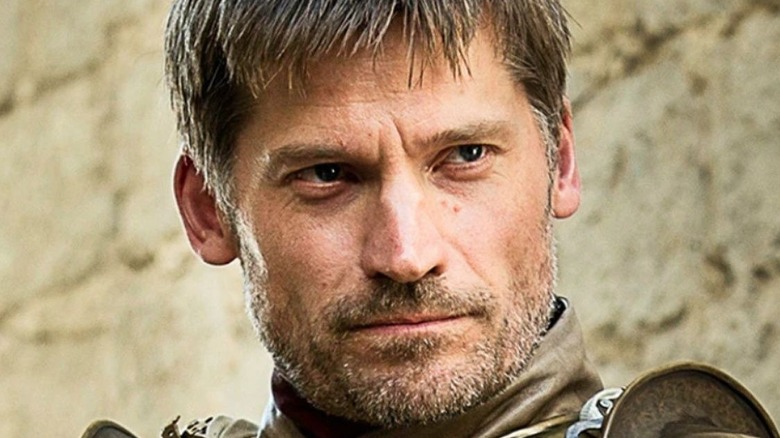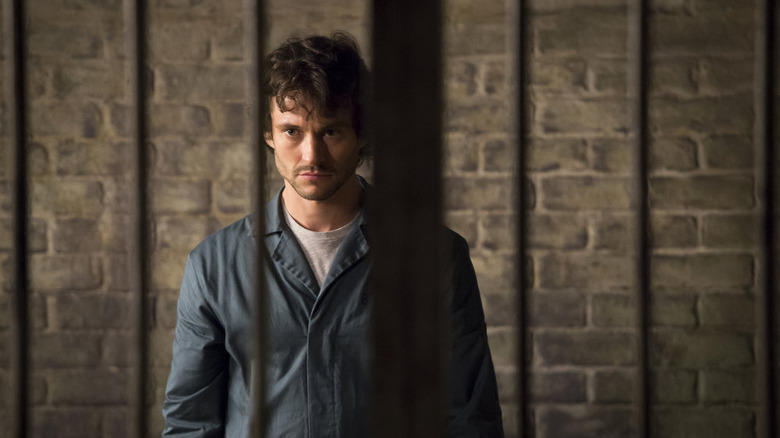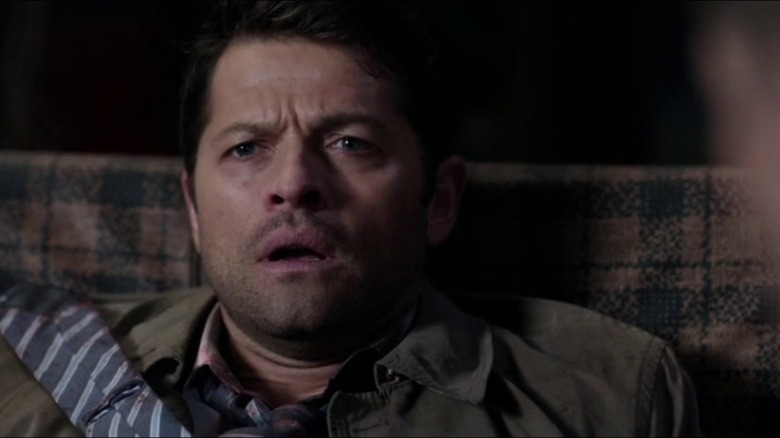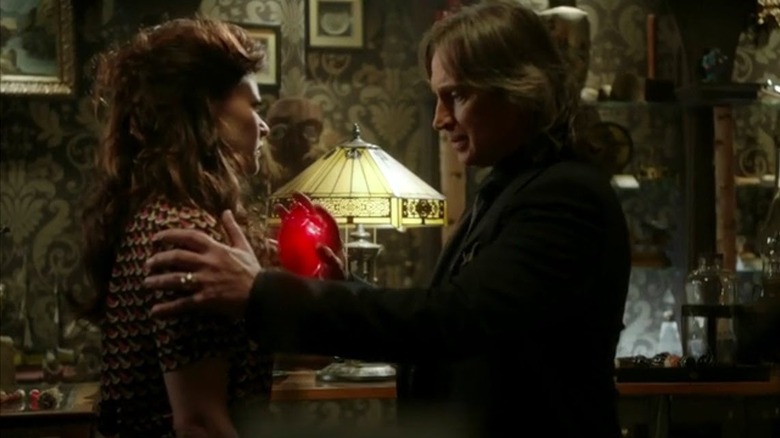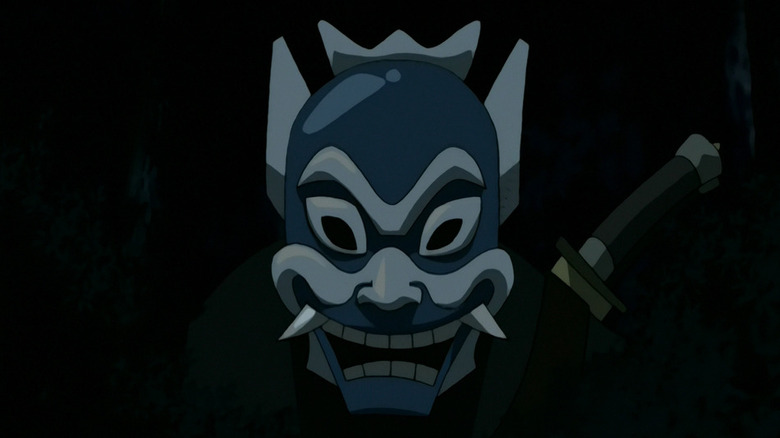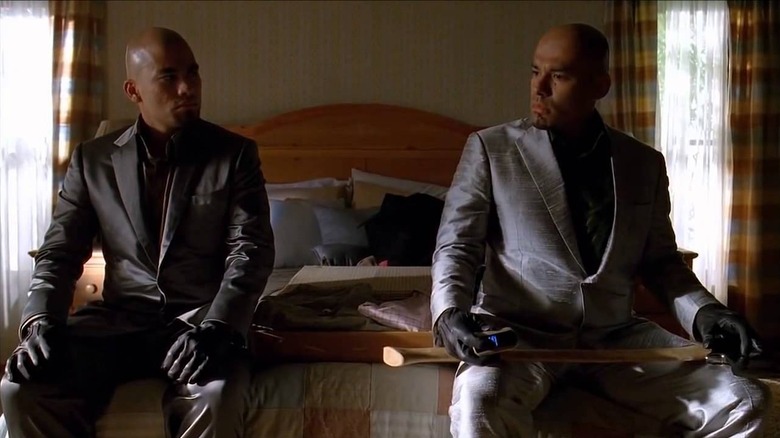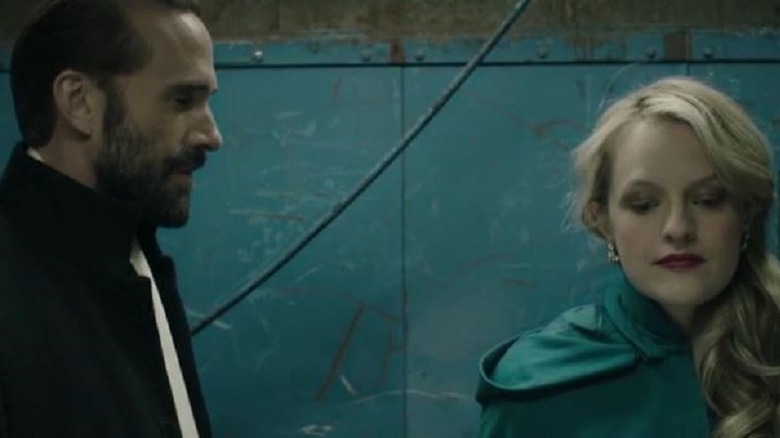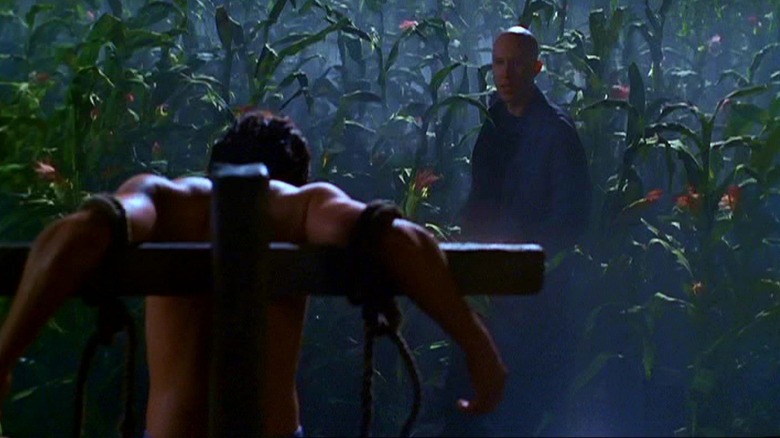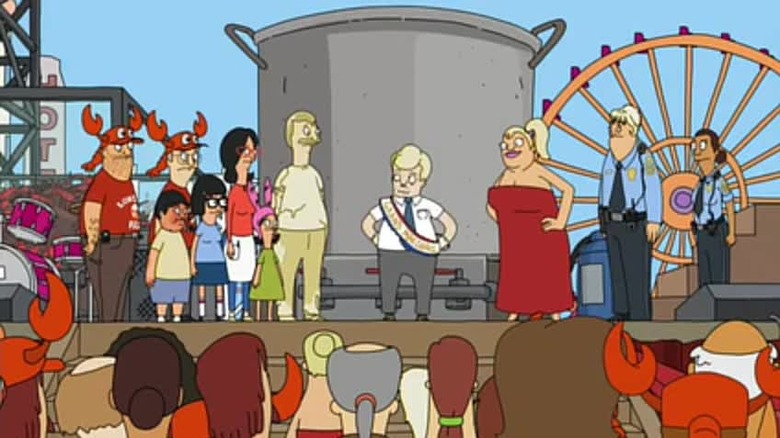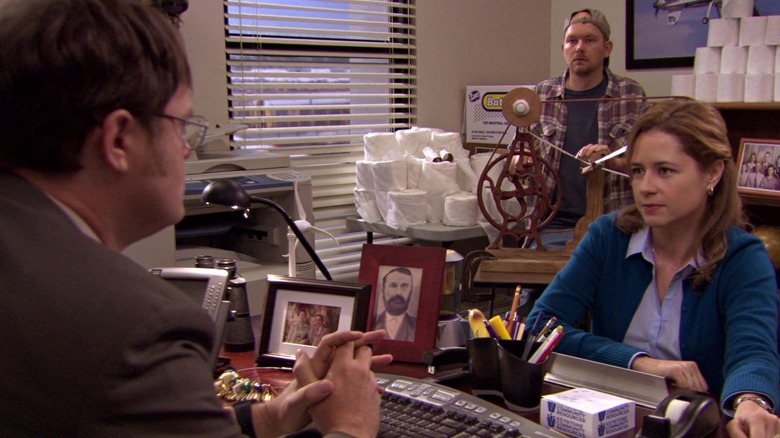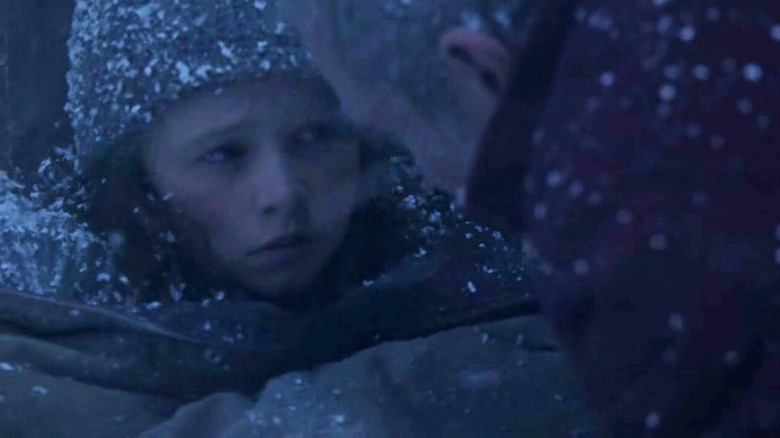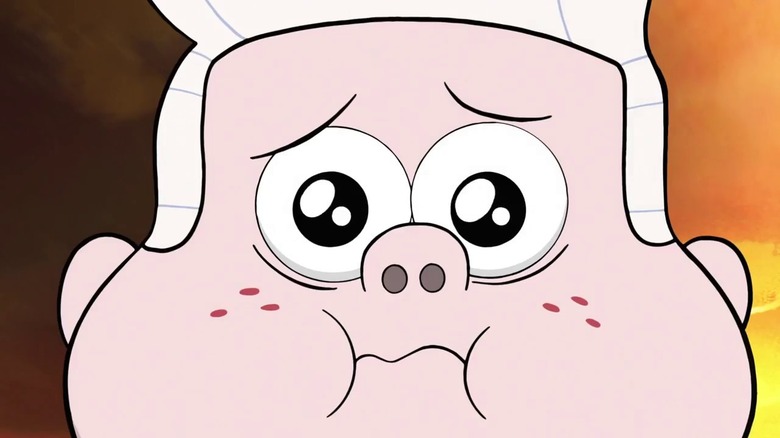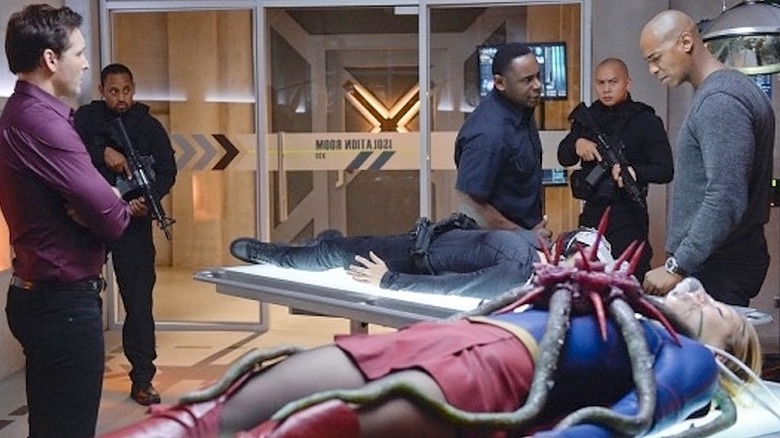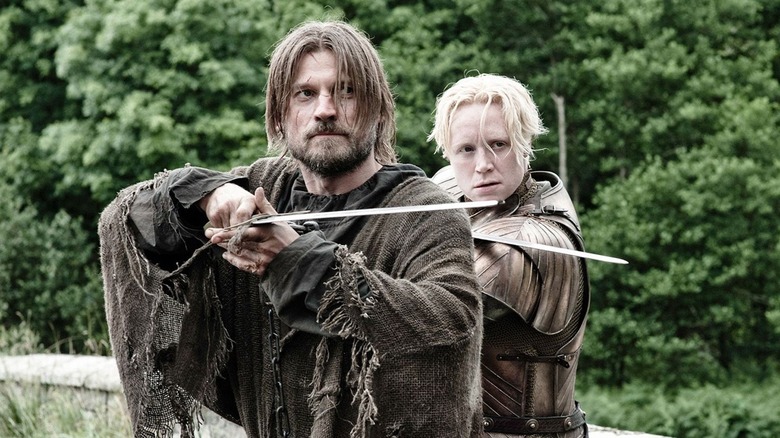TV Moments Where The Bad Guy Saves The Good Guy
The line between the good guys and the bad guys isn't always so cut-and-dry. Sometimes the bad guy has all the right motivations and just goes about it the "wrong" way, like Mr. Freeze, who just wants to find a cure for his wife's illness but often finds himself at odds with Batman and the law in the process.
Sometimes the good guy uses morally upstanding ends to justify shady means, like when Glinda the Good Witch basically steals the ruby slippers and plants them on Dorothy in order to manipulate the poor Kansas girl into conflict with the Wicked Witch of the West, Glinda's rival. Dorothy becomes a pawn in Glinda's quest to dispose of her enemy without getting her hands dirty — so who's really the wicked one?
This question can be posed time and time again. Good guys make mistakes. Bad guys redeem themselves. Good guys save the bad guys who have only recently tried to kill them. And sometimes on television, the bad guy actually saves the good guy! Whether motivated by compassion, personal gain, or something else altogether, occasionally the hero that the hero needs most ... is the villain.
Hannibal shows Will that he's more than chopped liver
Hannibal Lecter, in the countless portrayals of him that have surfaced over the years, is pretty much universally a bad guy. Sure, in 1991's "The Silence of the Lambs," he helps Clarice catch Buffalo Bill, but that was more part of his psychological gameplay than out of the goodness of his heart.
On television, Lecter is no less sinister. The namesake of the NBC series "Hannibal," Dr. Lecter is a brilliant practicing psychiatrist who develops a relationship with troubled, empathetic FBI special investigator Will Graham (even though he is destined to become his mortal enemy). Though he is a cannibalistic serial killer, Lecter is shown to care deeply for Will: He only frames Will for murders he himself committed in order to protect his own interests. (Not that that's an excuse, but let's be real, his intentions could have been a lot worse.)
But eventually in Season 2, Hannibal helps Will clear his name and get out of prison, undoing his own work to put him there in the first place. There are a number of theories as to his motivation: Perhaps he took pity on Will, or perhaps he was intending his imprisonment to be only a temporary fix. Either way, just as Hannibal is responsible for Will's misery, he is also responsible for his deliverance.
The supernatural order of things
There are certain characters who, to an extent, defy categorization into either "good" or "bad" camps. Crowley, a powerful demon who was once a human, is more chaotic and independent than strictly evil. In fact, throughout multiple seasons of "Supernatural," we see him repeatedly shifting from antagonist to anti-hero and back again.
Whether he is on the Winchesters' side or causing conflict, it is a fact of history that Crowley saves Castiel, the angel responsible for saving Dean Winchester from Hell, in various instances over numerous seasons. In Season 8, Crowley rescues Castiel from the clutches of Naomi, who massacred the customers and staff of a restaurant in an effort to force Castiel to reveal what he had done with the angel tablet she sought.
In Season 10, having grown fond of the angel, Crowley actually goes so far as to sacrifice the Lance of Michael, which he had wanted to use as a weapon against Lucifer, in order to save a mortally wounded Castiel. Crowley's character, and the "Supernatural" series in general, makes a habit of blurring the lines between good and evil, and we know at least one angel who's grateful for it.
Heart of (Mr.) Gold
Love is a powerful motivator. While it may or may not be enough to fundamentally change an evildoer into a hero, it's definitely good for a few timely rescues from certain doom. And in the whimsical world of "Once Upon A Time," a world where magic and fantasy are as real as the people standing next to you, love is even more powerful because it's imbued with the mystic, happy-ending-inducing properties inherent in fairy tales.
Rumpelstiltskin has done some terrible things to others and endured some terrible things himself. While he often features as the villain (eventually literally becoming the Dark One), he undeniably inspires a lot of empathy as well and has some pretty redeeming moments. One of his most hopeful arcs was when he fell in love with Belle and, as a result of his feelings for her, made repeated efforts to help or save her and those she cared about.
For example, he uses his magic to save her after Smee pushes her, handcuffed to a cart, over the town boundaries. He risks becoming a "monster" again, after finally turning good, in order to regain the power needed to help save Henry in the episode aptly titled "Save Henry." And most importantly, in the series finale, he sacrifices his heart and life to save Hook.
Often, even his most selfless-seeming deeds are performed for his own selfish reasons, as he himself admits, but Rumpelstiltskin plays the hero many times nonetheless.
Blue is the most honorable color
Long before Prince Zuko joined Team Avatar, he almost became friends with Aang. Or at least, that's how Aang's idealistic little heart would like to interpret it. Either way, it's undeniable that Zuko saved the Avatar's life, even as he himself was actively hunting him down and seeking to return him to the Fire Nation. Technically, Zuko only saved Aang from the clutches of Zhao because he needed to deliver him to the Fire Lord himself in order to restore his honor. But still.
Zuko's masked alter ego, the Blue Spirit, wields a pair of broadswords in Season 1, Episode 13 and takes out an entire prison force tasked with guarding the Avatar after his capture by Zhao. Zuko risks his own life to break Aang out, and while he doesn't intend to free him, he inadvertently does so when he is injured in the escape. And this happened long before he ever "officially" came to the good side.
Who knows what horrors would have befallen Aang if he'd remained in Zhao's custody — and, more importantly, what terrible fate would have awaited Sokka and Katara, who were relying on Aang to bring back the antidote to a bizarre and delirium-inducing flu? So really, when you think about it, Zuko saved everyone.
Putting off the hits
Okay, so maybe "good guy" isn't exactly a term most people would use to describe Walter White. But in the world of "Breaking Bad," he's a protagonist, whether you want to call him a hero, an anti-hero, or just a bit of a jerk. Because of his increasingly volatile personality and shady dealings, Walt's alliances are constantly shifting.
One of those tense and shaky relationships is the one Walt has with drug boss and restaurateur Gustavo Fring. They start off as collaborators (though their relationship could still be described as tense), but a series of fatal encounters strains their relationship for good. Still, it should not be forgotten that Gus was responsible at one point for saving Walt's life.
In the Season 3 episode "Caballo Sin Nombre," Gus' right-hand man Mike surveils the White residence and sees the Cousins sneak inside with an ax. Mike alerts Gus to the situation, and as the Cousins lie in wait for Walt to get out of the shower, they receive a text that says "POLLOS" and leave the premises, sparing Walt's life. Though he eventually tries to have Walt killed himself, Gus did once use his power and influence with the cartel to call off a hit.
A helping hand
It's a big deal for love to transcend a fundamentally antagonistic relationship, and an even bigger deal for this to happen in a dystopian society where the love in question is strictly forbidden. But this is exactly what happens in the strict and punishing world of "The Handmaid's Tale" when Fred Waterford falls in love with his handmaiden, series protagonist Offred.
Fred saves Offred, whose real name is June Osbourne, multiple times due to his feelings for her, breaking the rules of his own society, in which he holds a high position. The risk of helping a handmaiden — or even displaying any warmth or acknowledgement whatsoever toward her — is extremely high, but he does so anyway. And while his relationship with her is primarily abusive, and he deserves everything he gets, his taking her back after she gave birth in Season 2 was ostensibly all that stood between her and execution.
The archnemesis arc
One of the best parts of "Smallville" is seeing the seeds of the Superman narrative we're more familiar with germinate over many years. Witnessing Clark Kent as a teenager makes "becoming Superman" a coming-of-age story, as relatable as an alien can be. Within this rich backstory, there are details you never would have guessed, like the fact that Lex Luthor and Clark Kent once had something resembling a friendship.
Of course, Lex always had shady motivations, even before he became Superman's archnemesis. But back in their youth, the two were on what would comparably seem like great terms, and Lex even saves Clark's life on multiple occasions. In the very first episode, Clark Kent finds himself a victim of a sadistic prank known as the Scarecrow — having been weakened by Lana's kryptonite necklace — when he's hung up in a field by the senior football players during homecoming. Lex finds him and frees him.
And much later, in the 19th episode of Season 3, after the relationship between the two has grown more strained, Lex still finds it in his heart to save Clark when he is captured by Dr. Garner, who wants to experiment on him. Lex arrives for his own session with the doctor, sees Clark convulsing in a tank full of green liquid, and breaks the tank open, freeing him.
Future Lex Luthor probably kicks himself looking back on all the times he saved the man who would eventually become his greatest enemy.
For butter or for worse
The curmudgeonly health inspector Hugo on "Bob's Burgers" is one of the Belchers' chief antagonists. He always rolls up looking to stir up trouble due to an undying jealousy and desire for vengeance against Bob for stealing Linda away from him years ago. Hugo will pounce on any opportunity to take Bob and his establishment down, and barring that, he'll invent a reason for suspicion himself.
Except, apparently, in one critical instance. The first-season episode "Lobsterfest" centers around the animosity harbored by Bob, a through-and-through burger man, for the annual spectacle that gives the episode its name. This tension culminates in a police officer accidentally knocking Bob into the massive vat of butter supplied for the festival, after a livid Bob threatens to put his toe in it.
The angry mob threatens to descend upon Bob, but he is rescued by an unlikely savior: Hugo, who acknowledges that Bob had earlier helped him land his new girlfriend. The health inspector tests the butter for contaminants and declares it safe to eat, so the mob doesn't go after Bob for ruining Lobsterfest. It's safe to say that Hugo probably saved Bob's life and, in the process, passed on a (not literally) delicious chance to see him go down once and for all.
Assistant to the office administrator
While Dwight is painted in a more nuanced light as the series progresses, he's definitely a bit of an antagonist for much of the run of "The Office," even into its later seasons. That is especially true in the Season 7 episode "China." By this time, Dwight has become the building manager and enacted a draconian rule that includes half-ply toilet paper and placing a roach billboard over the windows.
When Dwight refuses to reason with her, Pam threatens to move to another office space, and she quickly finds one. Or rather, makes one up. When Dwight discovers that Pam has no alternative, he tortures her with this knowledge until he overhears her confiding in Jim that she's afraid of failing as an office administrator like she "failed" at art school and sales.
Dwight's assistant Nate secretly informs Pam of legal ammunition she can use against Dwight, and it is later revealed that Dwight himself sent Nate on this mission, helping Pam to beat him at his own game and challenge her sense of failure. He makes it a point to insist that he was not motivated by compassion... But as Jim high-fives Pam while they watch the roach billboard come down, Dwight watches surreptitiously from his car with a small but unmistakable smile of satisfaction.
The walking sled
On "The Walking Dead," we've dealt with all kinds of inhuman threats. Typically that means the undead, but sometimes the "heroes" encounter individuals so malevolent that they actually seem other-than-human. Negan was one such threat. He murdered brutally and with abandon. He had no remorse, and you couldn't reason with him. You didn't want him to redeem himself; you just wanted to watch him get what was coming to him.
And you certainly didn't want to see him humanized. But that's exactly what happened. Negan's relationship with Rick's daughter Judith, after Rick is presumed dead, is a major part of Negan's arc from unparalleled antagonist to somewhat sympathetic to borderline anti-hero.
While still essentially a captive of Alexandria, Negan saves Judith from a massive blizzard, voluntarily marching off into the whiteout to find her after she chases after Dog and disappears. He risks his life by going after her, and even more so when he takes off his own clothes to keep her warm. This is one of the first true pieces of evidence, far preceding the major role he plays for the heroes in the struggle against Alpha, that he may have a heart after all.
The Gideon, the bad, and the ugly
At the end of the world, all bets are off. All the things that used to seem so important, like being an evil pain in the neck, seem a little trivial in the face of cosmic apocalypse. At least, that's probably what Li'l Gideon Gleeful, the creepy, manipulative child psychic from "Gravity Falls," would tell you.
Gideon spent all summer trying to first win, and then coerce, Mabel's affection. He threatened the safety of her family and even tried to steal and sabotage the Mystery Shack. His power-mad personality leads him to intimidate and use others, stopping at nothing to get what he wants.
But at the end of the day (and world, in the episode "Weirdmageddon Part 1"), faced with a being more powerful and evil than he could ever hope to be, an interdimensional Dream-Demon who threatens the lives of those he just might begrudgingly care about, Li'l Gideon chooses a selfless act. Ordered by Bill Cipher to help keep Mabel imprisoned, he instead leaves his post and leads his minions to fight off Bill's advancing army.
Good and evil aren't black-and-white
Maxwell Lord, the CEO of Lord Technologies, has often clashed with Supergirl on the CW show of the same name. He's even created a Bizarro Supergirl to defeat her once and for all, has attempted to blackmail Alex Danvers, and has been known to test Supergirl by putting innocent civilians in danger.
All in all, Lord doesn't care about the consequences of his actions and is constantly caught up in the selfish pursuit of his own gain, so he's exactly the kind of guy the pure-hearted Kara would be at odds with. But without him, Supergirl wouldn't even be alive.
After she succumbs to a coma due to the effects of an alien plant known as Black Mercy in the first-season episode "For The Girl Who Has Everything," Supergirl's life is on the line. Maxwell, currently in holding at DEO Headquarters, helps Alex project into Kara's consciousness and aid her in fighting the hallucination. Without his help, she would have been lost forever.
A Lannister always saves his friends
After years of sadism and secrecy in which there was little evidence of genuine care for another human being other than his twisted, incestuous relationship with his sister, Jaime Lannister seemed like a "bad guy" through and through. He even pushed a child out of a tower!
But maybe he had genuinely just never had a healthy relationship with a woman, or any human. His growing bond with Brienne of Tarth is just about the closest he gets. They first meet when Catelyn Stark instructs Brienne to escort Jaime as a prisoner back to King's Landing. Hostility between them gives way to begrudging respect, and eventually a friendship.
This trust comes about primarily in Season 3, in part because Jaime saves Brienne multiple times. When they are captured by Bolton soldiers who intend to assault Brienne, Jaime suggests that there will be a big reward for her, but only if she is left alive and unviolated, thus saving her from a traumatic and painful ordeal in the episode "Walk of Punishment."
And when Jaime is on his way to King's Landing, he risks his own safety to turn back when he believes that Brienne is in danger, ultimately saving her from a bear pit where Locke has thrown her for entertainment in "The Bear and the Maiden Fair." His relationship with her is the only time we see Jaime behave truly selflessly: It's the closest he gets to redemption.
